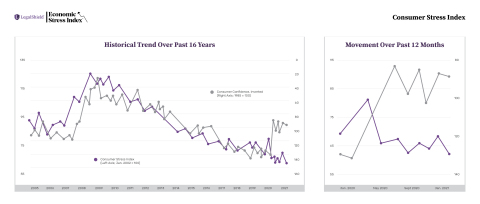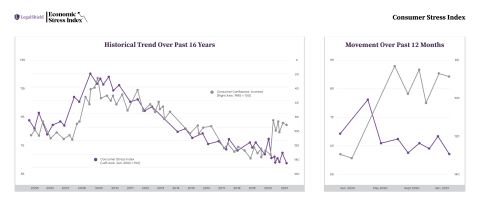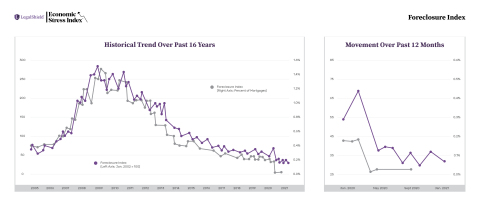ADA, Okla.--(BUSINESS WIRE)--Released today, LegalShield’s January report on specific services provided to plan members across the country by its exclusive provider attorney network, reflect the continuation of lowered consumer stress and foreclosed homes. This data fueled the January 2021 LegalShield Economic Stress Index™, which is both highly correlated with and predictive of the foremost economic indices around consumer confidence, housing starts, mortgage applications, vacancy/occupancy, and foreclosures. LegalShield’s Consumer Stress Index fell for the 2nd consecutive month proving that stimulus measures are working to alleviate consumer stress. Its Foreclosure Index, out ahead of other official data on foreclosure activity in early 2021, also fell in January, indicating that the moratorium on foreclosures for properties with federally backed mortgages is also working as intended.
“Our exclusive legal service provider network received fewer LegalShield member requests concerning bankruptcy, debt collections, foreclosures and evictions, pushing down our Consumer Stress and Foreclosure Indices,” said LegalShield CEO Jeff Bell. “This decreased level of requests for legal advice and support may well reverse with lower future stimulus support and a cessation of eviction moratoriums; however, for the time being, we expect consumer financial stress and foreclosure activity to remain in check.”
The LegalShield Economic Stress Index comprises five sub-indices -- Consumer Stress, Bankruptcy, Foreclosures, Housing Construction and Sales -- constructed from the company’s proprietary data, which reflect the demand for various legal services over the past 15 years. Each of the five sub-indices were selected because they tend to lead an existing economic indicator that sheds light on the health of the U.S. economy (i.e., the target economic indicator). Each time a provider law firm, in all 50 states, receives a request from a member, the request is logged as an “intake” in one of roughly 70 unique areas of law (e.g. - real estate) depending on the nature of the request. The company on average receives 80,000 intakes per month from its 1.8 million memberships, including individuals and small businesses, a statistically meaningful sample. In this way, the data provides actionable intelligence about the near-term direction of the U.S. economy.
Highlights from the January 2021 LegalShield Economic Stress Index™ are as follows:
-
The Consumer Stress Index fell (improved) 3.1 points in January to 62.8. Meanwhile, the Conference Board’s Consumer Confidence Index increased 0.7 point to 89.3 in January after declining in November and December as the recovery lost steam.
- The latest federal stimulus and extension of temporary mitigation measures (e.g., eviction and foreclosure moratoria and student loan repayment deferrals) have played a significant role in temporarily alleviating consumer stress.
- This coincides with an Opportunity Insights report showing that consumer spending improved substantially in January, particularly among lower-income households.
- According to a recent Census Bureau survey, 5% (or 2 million) fewer people in the lowest income bracket said it was “very difficult” to pay for their usual expenses in the week after stimulus checks reached bank accounts — suggesting December’s relief bill is helping consumers most in need.
- Simultaneously, vaccine rollouts have likely made consumers more optimistic about their finances in 2021: the New York Fed reports that expectations for annual household income growth rebounded to 2.4% in January, the highest point since February 2020.
-
The Foreclosure Index declined (improved) 3.8 points to 32.6 in January. This reflects the impact of foreclosure and eviction moratoria on federally backed properties through February.
- Though this is a temporary shield for many consumers, it also makes it difficult for lenders to determine the strength of mortgage portfolios for single- and multifamily residences.
- Across credit products, lenders are bracing for losses as the share of mortgage loans in forbearance continues to climb. Other types of loans in forbearance have held steady or declined.
- A recent paper from The National Bureau of Economic Research supports this data: between March and October of 2020, of the $2 trillion in loans that entered forbearance, more than half was mortgage debt.
- Highest rates of forbearance occur amongst vulnerable populations and in those residing in regions with more severe pandemic-related economic shocks.
- One-third of borrowers in forbearance continued to make full payments.
- Two-thirds of borrowers haven’t kept up on payments.
- Debt and interest accrued over the last several months could lead to a rapid increase in foreclosure activity when emergency mitigation measures are eventually lifted.
- The Bankruptcy Index dropped (improved) 1.9 points to 28.0 in January, falling for the second consecutive month. Although bankruptcies should remain low in the near term, upward pressure is likely to build over the course of the year.
- The Housing Construction Index eased from 141.2 to 138.3 in January, but still marks the third-highest level on record and is still well above pre-pandemic levels, suggesting housing construction should remain strong this quarter, but bears watching.
- The Housing Sales Index fell 6.3 points in January to 112.8 but remains well above pre-pandemic levels. In the near term, strong demand will likely help existing home sales maintain their momentum, though affordability concerns could begin to weigh on sales later in the year if more supply does not come onto the market.
Keybridge LLC, a boutique economic and public policy consulting firm based in Washington D.C., is responsible for independently compiling and analyzing the LegalShield data and developing the accompanying economic narrative.
About LegalShield and IDShield
A trailblazer in the democratization of affordable access to legal protection, LegalShield is the world's largest platform for legal, identity, and reputation management services covering more than 4.4 million people. Its IDShield identity theft solution for individuals and families has more than one million members. LegalShield and IDShield serve more than 140,000 businesses. In addition, over 34,000 companies offer LegalShield and IDShield plans to their employees as voluntary benefits. Both legal and identity theft plans start for less than $25 per month. For more information about LegalShield, visit: https://www.legalshield.com or for more information about IDShield, visit: https://www.idshield.com/.





